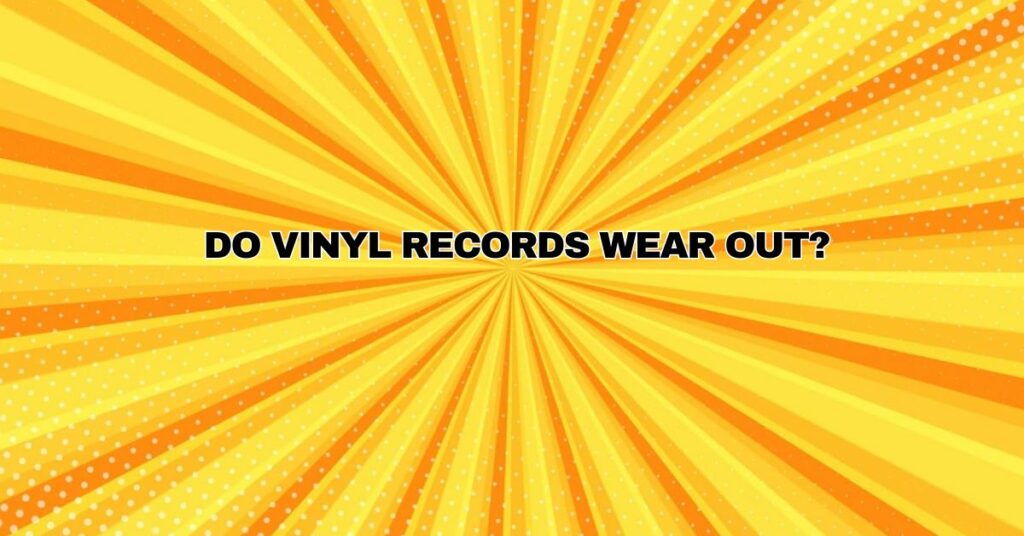Vinyl records have captivated music enthusiasts for generations with their warm analog sound, iconic album artwork, and tangible connection to music history. Yet, a common question lingers in the minds of collectors and audiophiles: Do vinyl records wear out? In this article, we’ll embark on a journey through the world of vinyl records, unraveling the mysteries of wear and tear, and discovering how to prolong the life of your cherished vinyl treasures.
Understanding Vinyl Records
Before diving into the longevity of vinyl records, let’s first understand their composition and how they work.
1. Vinyl Composition
Vinyl records are made from polyvinyl chloride (PVC), a durable plastic material. The record’s surface is grooved with spiral grooves that contain the analog audio information. A stylus or needle on a turntable’s tonearm tracks these grooves, translating the physical vibrations into audible sound.
2. Playback Process
When a vinyl record is played, the stylus makes physical contact with the grooves, causing friction and wear. This process is inherent to vinyl playback and is a natural part of the format.
Vinyl Record Wear: What to Expect
Vinyl records are not immune to wear, but their durability and lifespan depend on several factors:
1. Record Condition
The condition of the vinyl record itself is a critical factor in determining its wear. Records in mint or near-mint condition will experience minimal wear during playback, while records with scratches, scuffs, or other imperfections will wear more quickly.
2. Turntable and Stylus Condition
The quality and condition of your turntable and stylus also play a significant role in vinyl wear. A well-maintained, properly calibrated turntable with a high-quality stylus will exert less pressure on the grooves, reducing wear.
3. Tracking Force
The tracking force, or the downward pressure applied by the stylus on the record, should be within the manufacturer’s recommended range. Too much tracking force can accelerate wear, while too little can cause tracking errors.
4. Anti-Skating
Proper anti-skating adjustment on a turntable helps maintain even stylus pressure across the grooves, reducing wear on one side of the groove walls.
5. Record Cleaning
Clean records experience less wear. Dust, dirt, and debris on the record’s surface can cause friction and accelerate wear. Regular cleaning can mitigate this.
Vinyl Record Longevity and Preservation
While vinyl records may eventually show signs of wear over time, their longevity can be extended with proper care and handling:
1. Store Records Vertically
Store records vertically to prevent warping. Use purpose-built record storage solutions to support the weight of the records.
2. Handle Records with Care
Handle records by their edges to avoid touching the grooves. Fingerprints and oils can attract dust and dirt, affecting playback.
3. Keep Records Clean
Regularly clean records using a carbon fiber or velvet brush, an anti-static brush, or a record cleaning machine. Remove dust and debris to reduce friction during playback.
4. Maintain Your Turntable
Regularly maintain and calibrate your turntable and stylus. Check tracking force and anti-skating settings to ensure proper playback.
5. Use Inner Sleeves
Replace or use anti-static inner sleeves to protect the record’s surface from scratches and static buildup.
6. Control Playback Conditions
Avoid extreme temperature and humidity changes, as they can warp records. Play records in a clean, dust-free environment.
The Lifespan of Vinyl Records
Vinyl records, when cared for properly, can provide decades of listening enjoyment. The exact lifespan of a vinyl record depends on various factors, including how frequently it’s played, the quality of the pressing, and the care it receives.
In general, records in excellent condition can withstand hundreds of plays before showing noticeable wear. Even then, the wear may be minimal, and the record can still provide enjoyable sound quality.
Conclusion
Vinyl records do experience wear over time, but their longevity and sound quality can be preserved with meticulous care and proper handling. While records are not invulnerable to wear and tear, the joy they bring to music enthusiasts far outweighs the occasional need for cleaning and maintenance.
So, do vinyl records wear out? Yes, they can, but with attentive care and a love for the format, your vinyl collection can continue to spin for many years, delivering the rich, warm sound that has made vinyl a timeless medium for music appreciation.


